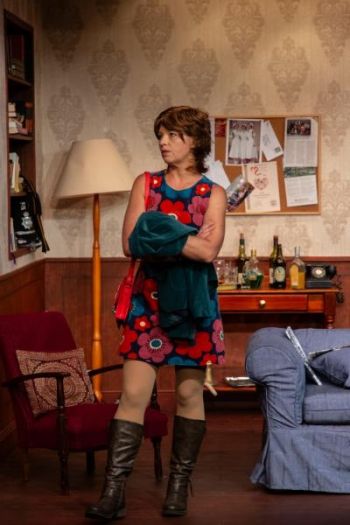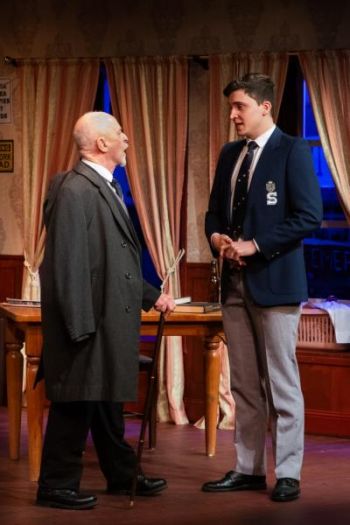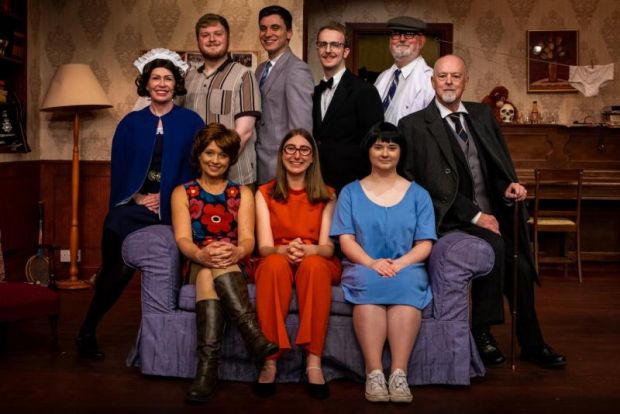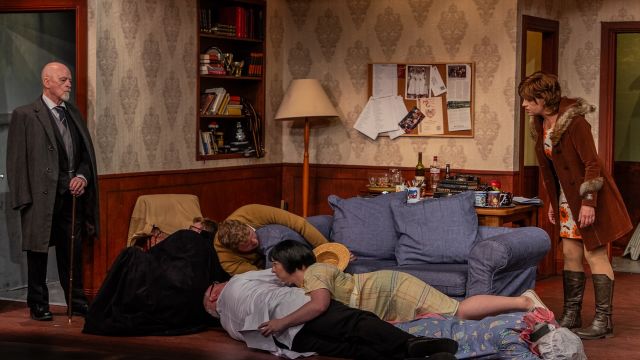Doctor in the House
Medical students Tony and John, together with Tony’s live-in girlfriend Vera, welcome a new student to their house. Simon Sparrow. He’s the nephew of the dominating and influential Sir Lancelot Spratt, and is shoe-horned into the established shared lodgings, playing drinking games and singing raucous songs – but it’s England in the 1950s, so it’s mostly clean fun, with a dose of dated values being medicated by some strong female personalities.
It's a perfect production for Tea Tree Players, though even the director Brian Godfrey seemed surprised that it hadn’t previously been performed here. It’s good to see some young talent on stage and extra special to see that the majority of the cast have grown up with the Youth group of Tea Tree Players – a great way to sustain the performing arts when many other companies have ageing committees and audiences.
 Originally a 1952 novel, then a film starring Dirk Bogarde, Muriel Pavlow, Kenneth More and Donald Sinden, it has been adapted into numerous television series, including an Australian version in 1979, as well as this stage adaptation, which simplifies the original plot to present the entire story in the living rooms of the student shared house across a few years.
Originally a 1952 novel, then a film starring Dirk Bogarde, Muriel Pavlow, Kenneth More and Donald Sinden, it has been adapted into numerous television series, including an Australian version in 1979, as well as this stage adaptation, which simplifies the original plot to present the entire story in the living rooms of the student shared house across a few years.
Tea Tree Players’ sets are often in danger of upstaging the real-life performers, and Damon Hill’s design and construction is realistic and incredibly detailed – there’s an doorway at the back of the stage that shows just enough to inform the audience there’s much more of the house than what we see on the stage.
Its initial occupants are students Tony and John, played by Ben Proeve and Kyle McCarthy. Both take on the stiff theatrical acting style of the 1950s and adapt well to the old-fashioned upper-class accents and dialect. McCarthy particularly is excellent in immersing into his character of a competent student who’s more interested in drinking and playing ‘rugger’. Proeve hams up his role as a perpetual student – an income guaranteed providing he remains at medical school – and he creates a believable relationship with his live-in girlfriend Vera, played by Rebecca Mason.
Mason does well to lift her character out of the 1950s with defiance and resistance against the stereotypes pushed onto her by the men in the house, though she’s always getting them drinks and tempting them with food.

The script is a little uneven – clearly condensed from a more complex story, some of the scenes seem to go nowhere and motivations are unknown – but under the direction of Godfrey, the performers don’t push too far out of the period’s characterisations. This helps to keep the comedy front-and-centre, which would garner even more laughter from the audience if the pace stepped up a little.
Clinton Nitschke is Simon Sparrow, the naïve student from a different class to the others, there only because of family connections. There’s an opportunity here for some subtext on access to higher education but it’s largely played for laughs. Nitschke is best in physical comedy, where his innocence to the ways of life is used to others’ advantage.
Mike Phillips does a good characterisation of Bromley, the hospital porter, who doesn’t quite fit in with the student life but has seen it all before. Phillips treads that line skilfully, bringing out the class distinction amongst the humour.
Barry Hill is excellent as the forceful yet forgetful surgeon, Sir Lancelot Spratt – Hill’s professionalism from his experience of directing and performing ensures his larger-than-life character never quite steals the scene from the rest of the ensemble. His comic timing greatly assists that of the others when he’s on stage.
Charlie Klose is a good Riggie, a young nurse who always seems hungry – her performance in the play within a play is hilarious: Klose maintaining a perfectly straight face the whole time.

Godfrey has assembled a balanced cast that allows just enough challenges to male-dominated values to bring them to a different focus seventy years on. He also ensures the comedy is played out without the audience having to think too hard, and the take-down climax involving the whole ensemble is excellently crafted. This is an easy show to enjoy and a good night out at the small theatre.
Review by Mark Wickett
Subscribe to our E-Newsletter, buy our latest print edition or find a Performing Arts book at Book Nook.

